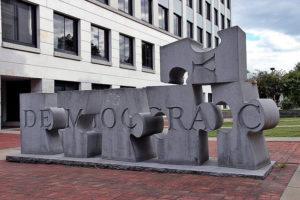Uncoupling Democracy’s Forms from their Purposes: A Crisis for Governance and a Boon for Populism
by Marcia Pally

I’m still pondering this bit of data: Americans who, under the proposed Republican replacement for Obamacare (Obama’s healthcare program), would have lost $1000 in government subsidies voted for Trump by 7 percentage points. Those who stood to lose $5000 or more voted for Trump by 59 to 36 percentage points.
What’s that about?
One thing it’s about—in addition to whatever else is known about populism—is the uncoupling of the forms of democracy from the purposes they were meant to achieve. The form of democracy at work here is (American) small-government-ism. But before I go there, let me give an example of what I mean by “uncoupling” form from purpose.
Until passage of the 1964 U.S. Civil Rights Act, “covenant” was the term for legal restrictions prohibiting blacks and Jews from purchasing property in white Christian areas. For those who knew “covenant” as the bond between the transcendent and all humanity—or as the bond between God and the Hebrews for “the blessing of all the nations”—it was an oddly exclusionary use of the term.
The discriminatory shift was possible because, in segregationist America, the form of covenant was uncoupled from its inclusive theology and ethics. It could now mean any abiding agreement, including exclusionary ones.
We call this a hoodwink, a deception that hides or separates critical information, like forms from their purposes.
Something similar is afoot in certain populist/neo-nationalist movements. The forms of democracy are maintained but disconnected from the purposes they were designed to meet. They may then be used for any ends, including those damaging to much of the demos.
This brings us to American small-government-ism, a form of democracy that puts citizen constraints on central government and keeps it small relative to civil society. The purpose is to prevent concentrations of power so that societal problems may be addressed with contributions from people and groups across demographics and the country.
Keeping government in check emerged from the three political philosophies that formed the nation, so for Americans, it has a lot of gravitas. The earliest was seventeenth century covenantal political theory, come to America with the Puritans. It understands humanity as living in networks–family amid community, communities amid nation. Politics, Johannes Althusius wrote, is the art of organizing social life for mutual aid and to prevent abuses by the wealthy and powerful against the covenanted network or commonwealth. It’s for this that Massachusetts enacted the 1641 Body of Liberties, much of which was incorporated into the U.S. Bill of Rights. The second philosophy was Aristotelian republicanism, which too sees people as social. Networked living is necessary for survival, and our fullest development is achieved in participating to the governance of the polis. As with covenantalists, Richard Kraut notes (256), the unjust person is one who shirks responsibilities to the commons and grabs undue benefits and power.
In liberalism, America’s third grounding philosophy, the individual is not so much networked as free from constraint to pursue opportunity. The idea of the “separable individual” got a loud hearing in America from its Protestant heritage, which emphasizes individual Bible reading and individual inner faith, and from the immigrant and frontier experiences. As many early Americans were fleeing oppressive states, their flight reinforced the advantages of limiting state power. The rough frontier conditions boosted the advisability of individual and local self-reliance and a wariness of “outsider,” “interfering” central government–which did not look reliable anyway as there was relatively little of it on the frontier to rely on.
Though the role of national government grew as did the country, localist, small-government-ism fostered a democratic critique of authority and robust civil society. It’s at work across the political spectrum, yielding local/state law both more progressive and conservative than federal legislation. Today, it’s the basis for local “sanctuary movements” that shield the undocumented from deportation under national anti-immigration policies.
What happens when wariness of central government is uncoupled from its covenantal/ republican purpose of shielding the body politic from abuses by the wealthy and politically powerful? It becomes a free radical. It may be propounded as a Good in itself, attached to any aims, and applied to all circumstances—even where government programs are beneficial owing, say, to economies of scale. In short, suspicion of oppressive government may become suspicion of any or all government efforts.
Importantly, whatever aim you link small-government-ism to will gain legitimacy by association with the form of time-honored, democratic wariness of government. The new purpose will “feel right” and be thought productive because it inherits the cloak of democracy from its familiar form and the productive role wariness-of-government has played in U.S. history.
But what’s under the emperor’s new cloak? Unless one assesses the new aims that small-government-ism furthers, one might not notice those that don’t benefit the republic. We call that a hoodwink.
Limiting government programs—as a Good in itself–is today used to promote the gutting of environmental protections, selling public lands for business development, gutting labor and consumer safety regulations, vitiating Obamacare, and reducing Medicaid, which provides healthcare for seventy-four million people including 40 percent of America’s children. The states who brought suit against Obamacare wrote to the Court of Appeals, “The individual mandate [requiring Americans to buy health insurance] rests on a claim of federal power that is both unprecedented and unbounded.” By contrast, Speaker of the House Paul Ryan said, under the new Republican plan “People are going to do what they want to do with their lives because we believe in individual freedom.”
And when Trump opened large Utah land tracts to business, he said, “Some people think that the natural resources of Utah should be controlled by a small handful of bureaucrats in Washington… They’re wrong.”
For many, framing healthcare and economics this way is convincing because the form of small-government has the ring of heritage and the persuasiveness of those instances when it helped the nation flourish. This returns us to our Trump supporters who voted against their own health subsidies. They are following a familiar, cherished form uncoupled from its purpose. In Strangers in Their Own Land, Arlie Hochschild calls this the “great paradox”—voting against government programs you need.
But it’s not a paradox. It’s a hoodwink.
#
Professor Marcia Pally teaches at New York University, at Fordham University, and is a regular guest professor at the Theology Faculty of Humboldt University, Berlin. Her most recent book is Commonwealth and Covenant: Economics, Politics, and Theologies of Relationality, which was nominated for a Grawemeyer Award and selected by the United Nations Committee on Education for Justice for distribution to their “educators, academics, policy-makers” worldwide. In addition, Prof. Pally has been a columnist and contributor to U.S. and European periodicals, including Religion and Ethics, Commonweal, The New York Times, The Guardian, Religion News Service, Die Zeit, Süddeutsche Zeitung, and Die Tageszeitung, among other periodicals.
Counterpoint blog posts may be reprinted with the following acknowledgement: “This article was published by Counterpoint: Navigating Knowledge (https://www.counterpointknowledge.org/a-crisis-for-governance-and-a-boon-for-populism) on 29 August 2018.”
The views and opinions expressed on this website, in its publications, and in comments made in response to the site and publications are those of the author(s) and do not necessarily reflect the views and opinions of Counterpoint: Navigating Knowledge, its founders, its staff, or any agent or institution affiliated with it, nor those of the institution(s) with which the author is affiliated. Counterpoint exists to promote vigorous debate within and across knowledge systems and therefore publishes a wide variety of views and opinions in the interests of open conversation and dialogue.



